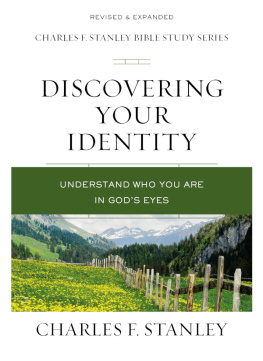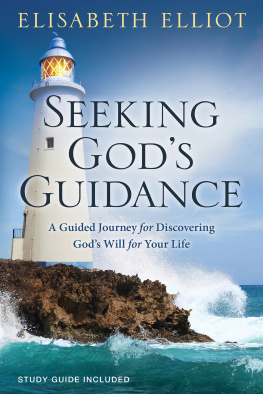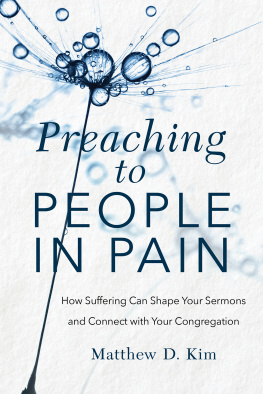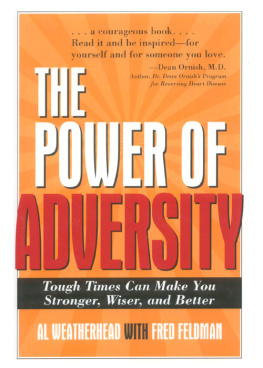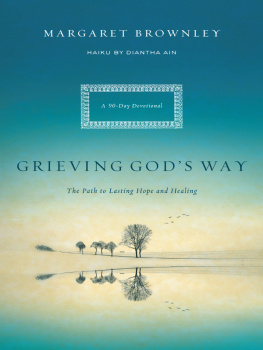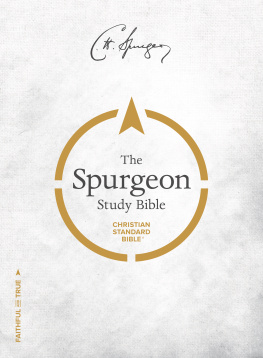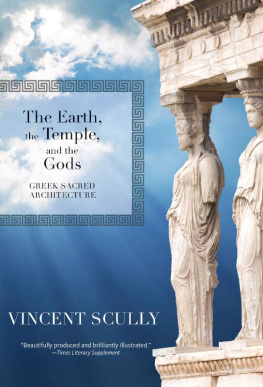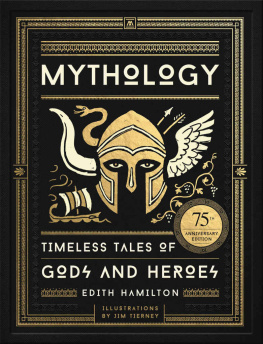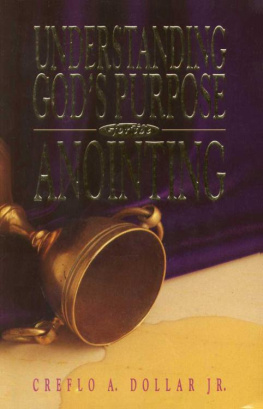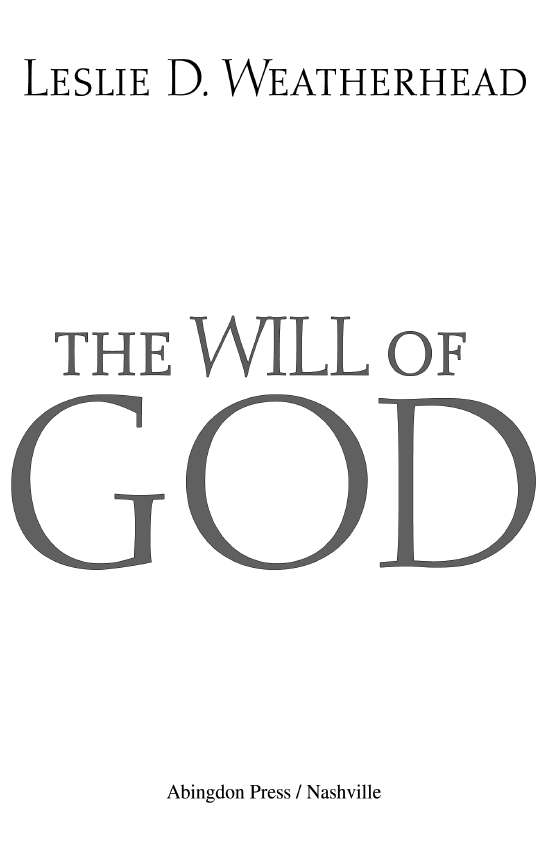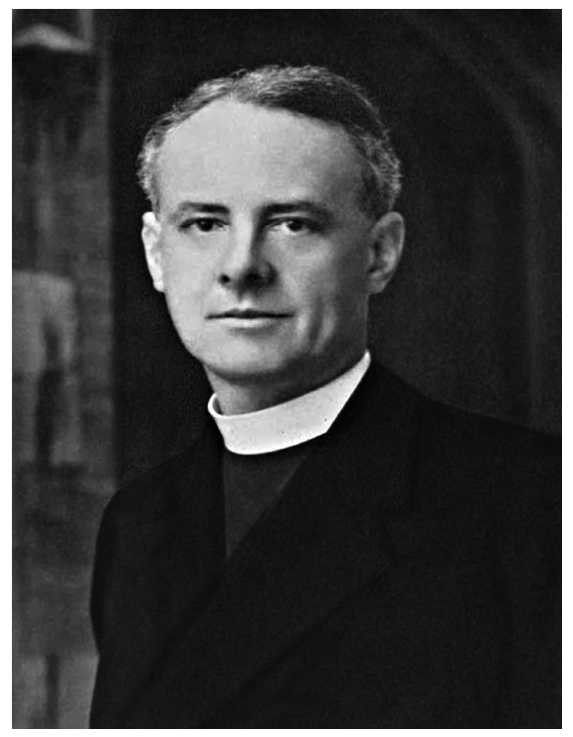Half-Title Page
The Will of God
Title Page
Copyright Page
THE WILL OF GOD
Copyright 1944 by Whitmore & Stone
Copyright renewal 1972 by Leslie D. Weatherhead
New material copyright 2016 by Abingdon Press
All rights reserved.
No part of this work may be reproduced or transmitted in any form or by any means, electronic or mechanical, including photocopying and recording, or by any information storage or retrieval system, except as may be expressly permitted by the 1976 Copyright Act or in writing from the publisher. Requests for permission should be addressed in writing to Abingdon Press, 2222 Rosa L. Parks Blvd., PO Box 280988, Nashville, TN 37228-0988.
ISBN 13: 978-1-4267-2502-9
Formerly published under ISBN 978-0-687-67482-2, 0-687-67482-7, 0-687-45573-1, 0-687-45599-5, 0-687-45575-8, 0-687-45600-2, and 0-687-45601-0.
Contents
Contents
: Leslie Weatherheads London
Dr. Leslie Weatherhead
Dr. Leslie Weatherhead in 1940, a few months before preaching his series of sermons, The Will of God.
Foreword
Foreword
The Will of God
I never met Leslie Weatherhead. I never heard him speak in person. But when people ask me which pastors have had the greatest influence on my life, he is one of the first I name.
Weatherheads ministry lasted from 1915, when he was ordained as a Methodist preacher, to 1960, when he retired as the senior minister at the City Temple, London. He began his ministry as a missionary to India and ended it as one of the leading preachers of his time, not only in Great Britain but in the world.
Yet Weatherheads ministry did not stop with his retirement in 1960, nor even at his death in 1976. Through his writings, he continues to speak to new generations. His books largely came from his preaching. He once wrote of preaching, When people gather to worship and listen, a minister must have a message fresh, timely, and, if topical, yet also part of the eternal truth about God. He must balance theological teaching, evangelical appeal, and biblical exposition, and also try to interpret modern events in the light of Gods purposes. This is precisely what Weatherheads books did for his readers.
His books, like his preaching, were an extension of his pastoral ministry. He wrote many of his books to answer questions that keep thinking people from embracing faith and to address doubts that most believers wrestle with from time to time. He provided such thoughtful and insightful answers that many came to faith, or had their faith restored, by reading his books. In his preaching and writing, he hoped to help people follow Christ, to make sense of the world they lived in, and to live their faith in daily life.
Weatherhead published more than forty books during his ministry. I have more than a dozen in my library, a couple of which are first editions. Ive read several of his books multiple times, including this one. I dont agree with everything he wrote, but even where I disagree, I appreciate his integrity, courage, and forthrightness.
At times Weatherhead was lambasted by his critics. Some claimed his preaching was too liberal. Of course, liberal is a relative term. If he was a liberal, he was an evangelical liberal. His greatest desires were to help nonreligious people find faith and to help Christians build a faith that could stand in the face of a changing world. He sought to challenge, comfort, deepen, and equip his readers. And he hoped to compel them to live their faith in such a way that they not only were praying but working to see that Gods kingdom would come on earth as it is in heaven.
Of all the books Leslie Weatherhead wrote, the one you hold in your hands is his most widely read and influential. In its pages, over a million people have found help in making sense of theodicythe tension between belief in a good and loving God and the reality of suffering in our world. Forty years after his death, and seventy years after he wrote the book, it continues to provide some of the best answers to this age-old dilemma. I have given the book to dozens of people. It inspired me to write what I view as a companion to this book, similar in length and in focus: Why? Making Sense of Gods Will .
Im grateful that Abingdon is publishing this new edition of Dr. Weatherheads work. I hope and pray that this little book is as helpful to you as it has been to me.
Adam Hamilton
Preface
Preface
H ere are five talks on the will of God, given to my City Temple congregation. My friends the Rev. Edgar C. Barton and the Rev. Leslie F. Church thought their publication might help others to clarify their minds on a subject that is specially relevant to these days of loss and sorrow. I have left them in the direct style in which they were written down, and have not attempted to disguise the fact that they were prepared as sermons.
L.D.W.
1. Gods Intentional Will
Chapter one
Gods Intentional Will
T he phrase the will of God is used so loosely, and the consequence of that looseness to our peace of mind is so serious, that I want to spend some time in thinking through with you the whole subject. There is nothing about which we ought to think more clearly; and yet, I sometimes think, there is nothing about which men and women are more confused.
Let me illustrate the confusion. I have a good friend whose dearly loved wife recently died. When she was dead, he said, Well, I must just accept it. It is the will of God. But he is himself a doctor, and for weeks he had been fighting for her life. He had called in the best specialists in London. He had used all the devices of modern science, all the inventive apparatus by which the energies of nature can be used to fight disease. Was he all that time fighting against the will of God? If she had recovered, would he not have called her recovery the will of God? Yet surely we cannot have it both ways. The womans recovery and the womans death cannot equally be the will of God in the sense of being his intention.
Let me illustrate the confusion again. My boy was killed ten days ago in one of the raids on Berlin, said a woman, but I am trying to bow to the inscrutable will of God. But was that the will of God? I should have said it was the will of the enemy, of Hitler, if you like, of the evil forces we were fighting. Are they then the same thing?
Here is a mother wringing her hands and weeping in anguish because her baby is dead. Her minister stands by her, longing to comfort her; but though his presence and prayers may offer consolation, he knows only too well that when the storm is raging it is too late to talk about the anchor that should have been put down before the storm began. What I mean is that it is so important that we should try to think clearly before disaster falls upon us. If we do, then in spite of all our grief we have a philosophy of life that steadies us as an anchor steadies a ship. If we do not, the storm is so furious that little can be done until it has abated. If only the minister could have injected into the mind of the woman his own belief about God! But that, alas! is impossible. In her anguish, this is what the woman said: I suppose it is the will of God, but if only the doctor had come in time he could have saved my baby . You see the confusion of thought. If the doctor had come in time, would he have been able to outwit the will of God?


